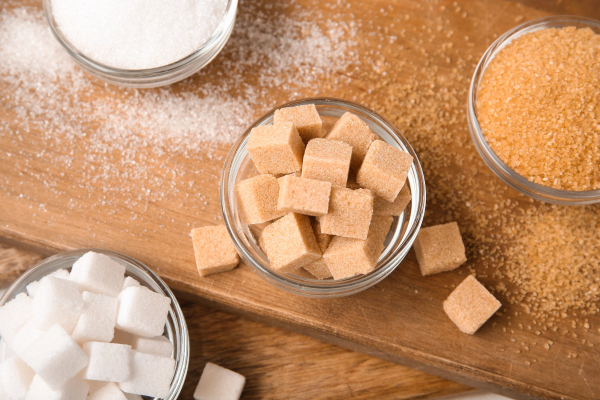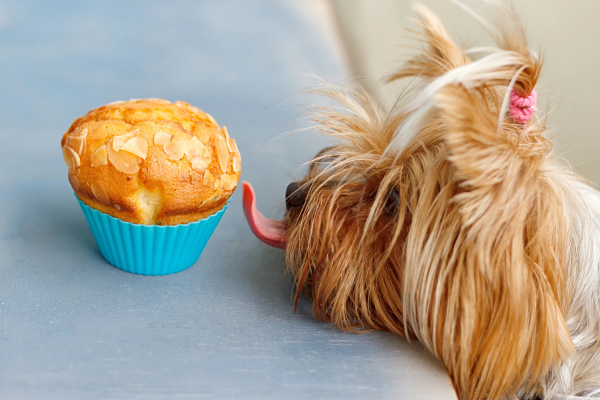While you’re eating a sugary snack you may wonder, “Is sugar bad for dogs? Or can I share a bit of my treat with my dog?” It can be hard to remember which human foods are safe and which may be problematic. To help, integrative veterinarian Dr. Julie Buzby answers common questions about what happens if a dog eats sugar.

Puppy dog eyes. We all know them. They’re nearly impossible to resist. And they’re guaranteed to make an appearance whenever I sit down on the couch with a bowl of ice cream.
If you find yourself in this situation too, you might be wondering if sugar is bad for dogs, and how dog owners can know whether it’s ok to give in to their dog’s pleading face.
Can dogs have sugar? Or is sugar bad for dogs?
While sugar itself is not toxic to dogs, it isn’t good for them either. In general, dogs should not eat sugar in large amounts. Plus, some types of sugar (table sugar) are worse for your dog than other types (fruit sugars). Thus, whether or not sugar is bad for dogs falls into a bit of a grey zone.
The safety of the sugar substitute xylitol (birch sugar) is black and white, though. As you will discover in a bit, xylitol is highly toxic to dogs, so anything containing xylitol it is definitely dangerous.
Do dogs need sugar in their diet?
Just like humans, dogs need carbohydrates in their diets. While sugar is a source of carbohydrates, it’s not the best way to go about fulfilling that particular nutritional requirement. The good news is that most of the time the store-bought versions of our pets’ food are nutritionally balanced and contain all the carbohydrates they need.
What happens if a dog eats sugar?
A small amount of sugar is unlikely to cause major problems for most dogs. However, excessive sugar consumption can cause weight gain, as well as other issues such as:
- Vomiting
- Diarrhea
- Inappetence
- High blood sugar
- Diabetes in dogs
- Pancreatitis in dogs
- Dental disease in dogs

A small bit of processed sugar isn’t likely to cause a huge issue for most dogs, but it’s far from a dietary requirement. And while dogs seem to like sugar, they shouldn’t consume it frequently or in large amounts.
What types of sugar are safe for dogs?
If you do want to reach for a sweet treat for your pup, natural sugars are generally safer than processed sugar. Fructose, the naturally occurring sugar found in fruits and some vegetables, is much healthier for dogs than sucrose (table sugar).
Fructose-containing snacks like apples and carrots are a better choice than things like cookies, ice cream, or whipped cream with sugar. Just make sure not to overdo it. These fruits and vegetables should be an occasional treat, and should not make up a significant portion (more than 10%) of your dog’s diet.
Safety note: Dogs should never be fed grapes or raisins. Although they’re a nutritious sweet snack for us, grapes and raisins are toxic to dogs. They can cause acute kidney failure that may even lead to death.
What types of sugar are bad for dogs?
The plethora of sugar types to choose from (there’s almost a whole grocery aisle devoted to them!), raises the question of whether any of the sucrose-based sugars are better for dogs than “regular” processed granulated sugar.
Unfortunately, these sugar variants fall into the same category as plain sugar. While they are not toxic, they’re not healthy, and I generally recommend avoiding them. Some of the sugars that are on the “bad for dogs list” include:
- Brown sugar
- Powdered sugar
- Cane sugar
- Cinnamon sugar
- Coconut sugar
- Corn syrup

Additionally, it is important to remember that some sugar-containing items—such as chocolate or caffeinated drinks—are toxic to dogs. Thus, you should avoid giving them to your dog completely. Even if your dog is not a morning person, pouring them their own cup of coffee with cream and sugar is more harmful than helpful. Enjoy yours, and let them stick to drinking water.
The sugar substitute Xylitol (birch sugar) is especially dangerous for dogs
While we’re discussing sugars and dogs, we must also consider artificial sweeteners. Some sugar substitutes, like Stevia and monk fruit, are not toxic to dogs. Butt they can cause many of the same effects as sugar.
However, one sugar substitute, xylitol, also called birch sugar, is extremely harmful to dogs. One of the dangerous things about it is that there are a litany of products containing xylitol, from sugar-free gum to peanut butter to toothpaste. It’s even in some medications.
Be sure to read the ingredient list carefully before giving your dog any “human food” treats. If the item includes xylitol or any of its pseudonyms like birch sugar, keep it out of your dear dog’s reach.
If a dog ingests xylitol, he or she needs an emergency vet visit ASAP. Xylitol toxicity can cause:
- Seizures
- Liver failure
- Vomiting
- Low blood sugar—the dog may look weak, stumble around, or act disoriented
- A lethargic dog
While a bit of real sugar probably won’t make a dog sick right away, that is not the case with xylitol. If your dog eats something containing xylitol, this is an emergency. Sadly, the blood sugar changes and liver disease in dogs from xylitol ingestion are often fatal to dogs.
What should I do if my dog eats sugar?
If your dog has eaten sugar (not xylitol), don’t panic. In all likelihood, he or she will be mostly fine. I wouldn’t recommend intentionally feeding sugar-containing products. But unless the sweet food contains a toxic substance, one-time sugar consumption is unlikely to cause serious health problems.

However, keep in mind that every dog is different. A healthy dog eating a bit of sugar may not have the same risk level as a diabetic dog eating a bit of sugar. If you’re not sure whether a food is ok for your dog, call your vet. His or her detailed knowledge of your dog’s health history can help your vet discern something harmless from something dangerous.
Additionally, if you are ever unsure about the health risks of something your dog ingested, it can be a great idea to contact animal poison control (ASPCA Animal Poison Control Center or Pet Poison Helpline). Even if the ingested item or food ends up being harmless, the call, and the fee associated with the call, are worth it for peace of mind. And if it turns out to be something dangerous, the knowledgeable poison control staff will tell you and your vet what to do.
A recipe for sweet success
In general, I recommend strictly limiting people food given to dogs, or avoiding it altogether. While some foods are safe to share, if you’re not 100% sure or if your vet hasn’t given the ok, it’s best to avoid that food. We can make lists of common foods that are safe and foods that are toxic, but we’ll never be able to form an exhaustive list. Plus, not all foods completely fall into one of those categories.
I know it’s hard to resist your dog’s pleading looks when he or she wants you to share your food. But hopefully knowing that it’s for their health will make it a little easier to keep sugary snacks to yourself. If only I had someone preventing me from eating them!
Do you have questions about dogs and sugar?
Please comment below.

